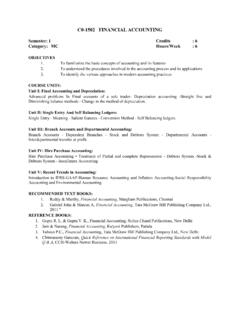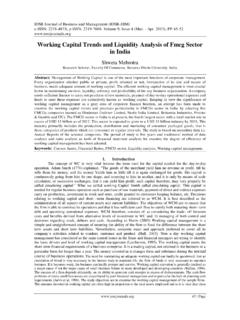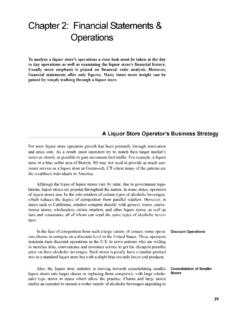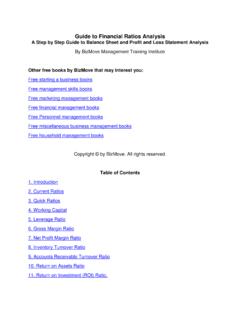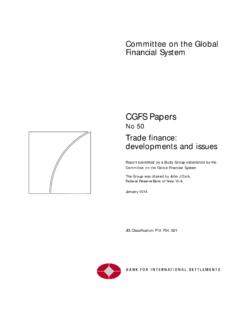Transcription of MBA - Loyola College, Chennai
1 MBACURRICULUMI Marks1 MBAC 1001 Management Concepts &Organisational Behaviour100502 MBAC 1002 Managerial Economics100503 MBAC 1003 Accounting forManagers100504 MBAC 1004 Business Environment & Law100505 MBAC 1005 Research Methodology10050II Marks1 MBAC 2001 Financial Management100502 MBAC 2002 Marketing Management100503 MBAC 2003 Human Resources Management100504 MBAC 2004 Operations Research andManagement100505 MBAC 2005 Strategic Management10050 MBA I SemesterPAPER IPaper Code: MBAC 1001 MANAGEMENT CONCEPTS & ORGANISATIONAL BEHAVIOURO bjectives To provide conceptual understanding of Management Concepts Tofamiliarize the students with the contemporary issues in Management To understand and appreciate the human behaviour in organisationsUNIT-INature of Management-Social Responsibilities of Business-Manager and EnvironmentLevels in Management-Managerial Skills-Planning-Steps in Planning Process-Scope andLimitations-Short Range and Long Range Planning-Flexibility in Planning Characteristicsof a sound Plan-Management by Objectives (MBO)
2 -Policies and Strategies-Scope andFormulation-Decision Making-Techniques and ProcessesUNIT IIAn Overview of Staffing, Directing and Controlling Functions-Organising-OrganisationStructu re and Design-Authority and Responsibility Relationships-Delegation of Authorityand Decentralisation-Interdepartmental Coordination-Emerging Trends in CorporateStructure, Strategy and Culture-Impact of Technology on Organisational design-Mechanistic Vs Adoptive Structures-Formal and Informal OrganisationUNIT IIIP erception and Learning-Personality and Individual Differences-Motivation and JobPerformance-Values, Attitudes and Beliefs-Stress Management-Communication Types-Process-Barriers-Making Communication EffectiveUNIT IVGroup Dynamics-Leadership-Styles-Approaches-Po wer and Politics-OrganisationalStructure-Organis ational Climate and Culture-Organisational Change and VComparative Management Styles and approaches-Japanese Management PracticesOrganisational Creativity and Innovation-Management of Innovation-EntrepreneurialManagement-Ben chmarking-Best Management Practices across the world-Select cases ofDomestic & International Corporations-Management of , Weirich &Aryasri,PRINCIPLES OF MANAGEMENT,Tata McGraw-Hill,NewDelhi,2004 Tripathi & Reddy,PRINCIPLES OF MANAGEMENT,Tata McGraw-Hill, New Delhi,2008 Laurie Mullins,MANAGEMENT AND ORGANISATIONAL BEHAVIOUR,Pearson,NewDelhi,2007 Meenakshi Gupta,PRINCIPLES OF MANAGEMENT,PHI Learning,NewDelhi.
3 2009 Fred Luthans,ORGANISA TIONAL BEHAVIOUR, TataMcGraw-Hill, NewDelhiStephen Robbins,ORGANISATIONAL BEHAVIOUR,Pearson, New DelhiRicky Griffin,MANAGEMENT: PRINCIPLES & APPLICATIONS,Cengage, NewDelhi,2008 MBA I SemesterPaper Code: MBAC 1002 PAPER IIMANAGERIAL ECONOMICSO bjectives To introduce the economic concepts To familiarize with the students the importance of economic approaches inmanagerial decision making To understand the applications of economic theories in business decisionsUNIT IGeneral Foundations of Managerial Economics-Economic Approach-Circular Flow ofActivity-Nature of the Firm-Objectives of Firms-Demand Analysis and Estimation-Individual, Market and Firm demand-Determinants of demand-Elasticity measures andBusiness Decision Making-Demand of Variable Proportions-Theory of the Firm-Production Functions in the Short andLong Run-Cost Functions Determinants of Costs Cost Forecasting-Short Run and LongRun Costs Type ofCosts-Analysis of Risk and Markets-Determination Under Different Markets-Market Structure PerfectCompetition Monopoly Monopolistic Competition Duopoly-Oligopoly-Pricing andEmployment of Inputs Under Different Market Structures Price Discrimination-Degrees ofPrice to National Income National Income Concepts-Models of National IncomeDetermination-Economic Indicators-Technology and Employment-Issues and Challenges Business Cycles Phases Management of Cyclical Fluctuations-Fiscal and VMacro Economic Environment-Economic Transition in India-A
4 Quick Review-Liberalization, Privatization and Globalization-Business and Government-Public-PrivateParticipation (PPP)-Industrial Finance-Foreign Direct Investment(FDIs).REFERENCESY ogesh Maheswari,MANAGERIAL ECONOMICS,PHI Learning, NewDelhi, 2005 Gupta ,MANAGERIAL ECONOMICS,Tata McGraw-Hill, New DelhiMoyer &Harris,MANAGERIAL ECONOMICS,Cengage Learning, NewDelhi, 2005 Geetika, Ghosh & Choudhury, ,MANAGERIAL ECONOMICS,Tata McGrawHill, NewDelhi,2011 MBA-I SemesterPaper code: MBAC 1003 PAPER IIIACCOUNTING FORMANAGERSO bjectives To acquaint the students with the fundamentals principles of Financial, Costand Management Accounting To enable the students to prepare, Analyse and Interpret FinancialStatements and To enable thestudents to take decisions using Management and Accounting Financial Accounting Concepts and Conventions DoubleEntry System Preparation of Journal, Ledger and Trial Balance Preparation of FinalAccounts Trading, Profit and Loss Account and Balance Sheet with adjustment entries,simple problems only-Capital and Revenue Expenditure and Causes Methods of Calculating Depreciation Straight Line Method,Diminishing BalanceMethod and Annuity Method-Ratio Analysis Uses and Limitations Classification of Ratios Liquidity, Profitability.
5 Financial and Turnover Ratios Simpleproblems Flow Analysis Funds From Operation, Sources and Uses of Funds,Preparation ofSchedule of Changes in Working Capital and Funds Flow Statements Uses and Limitations-Cash Flow Analysis Cash From Operation Preparation of Cash Flow Statement Usesand Limitations Distinction between Funds flow and Cash Flow only simple problemsUNIT-IVMarginal Costing-Marginal cost and Marginal costing-Importance-Break-even Analysis-Cost Volume Profit Relationship Application of Marginal Costing Techniques, FixingSelling Price, Make or Buy, Accepting a foreign order, Deciding sales Accounting-Elements of Cost-Types of Costs-Preparation of Cost Sheet StandardCosting Variance Analysis Material Variances Labour Variances simple problemsrelated to Material and Labour Variances only[Note: Distribution of Questions between Problems and Theory of this paper must be60:40 , Problem Questions: 60 % & Theory Questions: 40 %]REFERENCESJ elsy Josheph Kuppapally,ACCOUNTING FOR MANAGERS,PHI, Delhi, shah,BASIC ACCOUNTING FOR MANAGERS,Oxford, Delhi, 2007 Ambrish Gupta, FINANCIAL ACCOUNTING FOR MANAGEMENT,Pearson, Delhi, 2004 Narayanaswamy R, FINANCIAL ACCOUNTING ,PHI, Delhi, 2011 MBA-I SemesterPaper Code.
6 MBAC 1004 PAPER-IVBUSINESS ENVIRONMENT AND LAWO bjectives To acquaint students with the issues of domestic and global environment inwhich business has to operate To relate the Impact of Environment on Business in an integrated manner,and To give an exposure toimportant commercial and industrial lawsUNIT IDynamics of Business and its Environment Technological, Political, Social and CulturalEnvironment-Corporate Governance and Social Responsibility-Ethics in Business-Economic Systems and ManagementStructure-Family Management to Professionalism-Resource Base of the Economy-Land, Forest, Water, Fisheries, , Demographic Issues, Political context-ProductivityFactors, Human Elements and Issues for Improvement-Global Trends in Business andManagement-MNCs-Foreign Capital and Collaboration-Trends in Indian Industry-TheCapital Market of Contract-Agreement-Offer-Acceptance-Cons ideration-Capacity of ContractContingent Contract-Quasi Contract-Performance-Discharge-Remedies to breach ofContract-Partnership-Sale of Goods-Law of Insurance-Negotiable Instruments-Notes,Bills, Cheques-Crossing-Endorsement-Holder in due course-Holder in value-Contractof and Duties-Meetings-Proceedings Management-Accounts-Audit-Oppression and Mismanagement-Winding Act Licensing and Registration of Factories, Health, Safety and Welfare measures-Industrial Disputes Act Objects and scope of the Act, Effects of Industrial Dispute,Administration under the Act-Minimum Wages Act-Workmen Compensation ,LEGAL ASPECTS OF BUSINESS.
7 Tata McGraw-Hill Publishing Company Limited, NewDelhi, & William Frederick, BUSINESS AND SOCIETY, McGraw-Hill, Sulphey & Az-har Basheer,LAWS FOR BUSINESS,PHI Learning Pvt. Ltd. New Delhi,2011 Maheswari & Maheswari,MERCANTILE Publishing House. MumbaiRudder Dutt & Sundaram, INDIAN ECONOMY,Vikas Publishing House, New Keshav Pailwar,ECONOMIC ENVIRONMENT OF BUSINESS,PHI Learning Pvt. Ltd,New Delhi, 2010 MBA-I SemesterPaper code: MBAC 1005 PAPER-VRESEARCH METHODOLOGYO bjectives To enable the students to know about the information needs ofManagement To introduce the concept of Scientific Research and the methods ofconducting Scientific Enquiry and To introduce the Statistical Tools of Data Qualities of Researcher Components of Research Problem Various Steps inScientific Research Types of Research Hypotheses Research Purposes-Research Design Survey Research Case Study Collection Sources of Data Primary Data Secondary Data-ProcedureQuestionnaire Sampling methods Merits and Demerits Experiments Observationmethod Sampling Errors-Type-I Error & Type-II Analysis Introduction to Statistics Probability Theories ConditionalProbability, Poisson Distribution.
8 Binomial Distribution and Properties of NormalDistributions Hypothesis Tests One Sample Test Two Sample Tests / Chi-Square Test,Association of Attributes-Standard deviation Co-efficient of variations .UNIT-IVStatistical Applications Correlation and Regression Analysis Analysis of Variance Partial and Multiple Correlation Factor Analysis and Conjoint Analysis MultifactorEvaluation Two-Factor Evaluation Reports Structure and Components of Research Report Types of Report,characteristics of Good Research Report, Pictures and Graphs, Introduction to SPSS.[Note: Distribution of Questions between Problems and Theory of this paper must be40 , Problem Questions: 40 % & Theory Questions: 60 %]REFERENCESP anneerselvam, R., RESEARCH METHODOLOGY,Prentice Hall of India, New Delhi, CR ,RESEARCH METHODOLOGY-METHODS AND TECHNIQUES,New WileyEastern Ltd.
9 , Delhi, SemesterPaper code: MBAC 2001 PAPER-VIFINANCIAL MANAGEMENTO bjectives To know the various sources of finance To understand the various uses for finance and To familiarize oneself with the techniques used in financial Financial goals-Profit vs. Wealth Maximization; FinanceFunctions Investment, Financing and Dividend Decisions Cost of Capital Significanceof Cost of Capital Calculation of Cost of Debt Cost of Preference Capital Cost of EquityCapital (CAPM Model and Gordon s Model) and Cost of Retained Earnings CombinedCost of Capital (weighted/Overall).UNIT-IICapital Budgeting Nature of Investment Decisions Investment Evaluation criteria NetPresent Value (NPV), Internal Rate of Return (IRR), Profitability Index (PI), Payback Period,Accounting Rate of Return (ARR) NPV and IRR and Financial Leverage Measurement of Leverages Effects of Operating andFinancial Leverage on Profit Analyzing Alternate Financial Plans-Combined Financialand Operating Leverage Capital Structure Theories-Traditional without Taxes and with Taxes Net Income Approach (NI) Net OperatingIncome Approach (NOI)
10 -Determining capital structure in Policies Issues in Dividend Decisions Relevance Theory Walter's Model Gordon's Model Irrelevance Theory M-M hypothesis-Dividend Policy in Practice Forms of Dividends Stability in Dividend Policy Corporate Dividend of Working Capital Significance and types of Working Capital CalculatingOperating Cycle Period and Estimation of Working Capital Requirements Financing ofWorking Capital and norms of Bank Finance Sources of Working capital Factoringservices Various committee reports on Bank Finance Dimensions of Working CapitalManagement.[Note: Distribution of Questions between Problems and Theory of this paper must be40:60 , Problem Questions: 40 % & Theory Questions: 60 %]REFERENCESKhan MY, Jain PK,BASIC FINANCIAL MANAGEMENT,Tata McGraw Hill, Delhi , , Prasanna,.FINANCIAL MANAGEMENT,Tata McGraw Hill, Banerjee,FUNDAMENTALS OF FINANCIAL MANAGEMENT,PHI, Delhi, 2010 Chandra Bose D,FUNDAMENTALS OF FINANCIAL MANAGEMENT,PHI, Delhi, 2010 Preeti Singh,FUNDAMENTALS OF FINANCIAL MANAGEMENT,Ane, SemesterPaper Code: MBAC 2002 PAPER-VIIMARKETING MANAGEMENTO bjectives To familiarize with thebasic concepts, and techniques of marketing management To understand the behaviour of consumers To create awareness of marketing mix elements, and To analyse and solve marketing problems in the complex and fast changingbusiness to Marketing and Marketing Management, Marketing Concepts-MarketingProcess Marketing mix-Marketing Markets and buying behaviour-Market segmentation and targeting and Decisions-concept of aProduct-Product mix decisions-Brand Decision-NewProduct Development Sour


